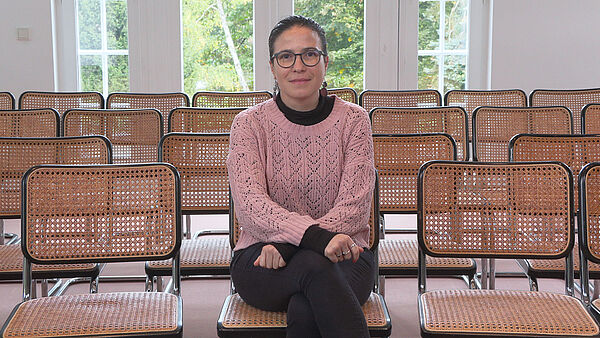
Mariana Gómez-Schiavon, Ph.D.
Principal Investigator
National Autonomous University of Mexico (UNAM), Campus Juriquilla, Queretaro
from September to December 2024
Born in 1986 in Puebla, Mexico
B.Sc. in Genome Sciences from the National Autonomous University of Mexico, M.Sc. in Biomedical Engineering and Physics from the Center for Research and Advanced Studies (CINVESTAV), and Ph.D. in Computational Biology and Bioinformatics from Duke University
Fellowship
College for Life Sciences
Arbeitsvorhaben
Mathematical Modeling to Reshape Our Understanding of Biological Systems
Understanding how an organism’s genetic information translates into specific observable traits poses a significant challenge in biology. This task is particularly difficult due to the intricate interplay between regulatory genes and environmental factors, which collectively give rise to phenotypic traits. The field of Systems Biology has tackled this problem, aiming to understand how and when these traits emerge and function. Central to this endeavor are mechanistic mathematical models, which describe the dynamics of gene regulatory systems employing mathematical functions to represent molecular events.Undoubtedly, mathematical modeling stands as a powerful tool in biological research, enabling scientists to interrogate the logical consequences of their assumptions, identify gaps in understanding, and design more informative experiments. However, as our ability to make precise measurements of biological systems improves, traditional models struggle to accommodate the observed fluidity and stochastic nature of these systems. Consequently, there is a pressing need for a fresh interpretative framework that can reconcile the complexity of biological systems with our growing understanding.
Based on the available evidence, I am convinced that we stand at the precipice of a paradigmatic shift in the conceptualization of molecular biology. Yet, effecting this transition requires more than mere refinement of mathematical models; it necessitates a fundamental reevaluation of our conceptual approach to biological processes. I assert that this theoretical shift will not only dramatically reshape mathematical models, but also that mathematical models will, in turn, play an essential role driving this new theoretical conceptualization. As such, I aim to explore the pivotal role of mathematical modeling in guiding this conceptual transition, examining both its philosophical implications and practical applications.
Recommended Reading
Chevalier, Michael, Mariana Gómez-Schiavon, Andrew H. Ng, and Hana El-Samad (2019). “Design and Analysis of a Proportional-Integral-Derivative Controller with Biological Molecules.” Cell Systems 9: 338–353.e10. https://doi.org/10.1016/j.cels.2019.08.010.
Gómez-Schiavon, Mariana, and Nicolas E. Buchler (2019). “Epigenetic Switching as a Strategy for Quick Adaptation While Attenuating Biochemical Noise.” PLoS Computational Biology 15 (10): e1007364. https://doi.org/10.1371/journal.pcbi.1007364.
Gómez-Schiavon, Mariana, and Hana El-Samad (2022). “CoRa – A General Approach for Quantifying Biological Feedback Control.” Proceedings of the National Academy of Sciences 119 (36): e2206825119. https://doi.org/10.1073/pnas.2206825119.
Kolloquium, 22.10.2024
The Limitations of the Cell-as-Machine Analogy: Rethinking Biological Systems through Mathematical Modeling
As advances in measurement technologies provide ever more precise data, the traditional view of the cell as a machine struggles to capture the inherent fluidity and stochasticity of biomolecular systems. This calls for a new interpretative framework. In this talk, I will explore the limitations of the machine analogy, its implications for my own research, and the broader field of Systems Biology. I will also discuss how mathematical modeling can guide this conceptual transition, highlighting both its philosophical significance and practical applications.
Publikationen aus der Fellowbibliothek
Gómez-Schiavon, Mariana (Washington, DC, 2022)
CoRa - a general approach for quantifying biological feedback control
Gómez-Schiavon, Mariana (Maryland Heights, MO, 2019)
Design and analysis of a proportional-integral-derivative controller with bilogical molecules
Gómez-Schiavon, Mariana (San Francisco, Calif., 2019)
Epigenetic switching as a strategy for quick adaptation while attenuating biochemical noise
